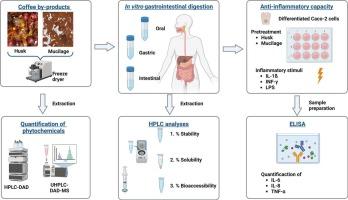Bioaccessibility and anti-inflammatory activity in Caco-2 cells of phytochemicals from industrial by-products of coffee (Coffea arabica L.)
IF 4
2区 农林科学
Q2 FOOD SCIENCE & TECHNOLOGY
引用次数: 0
Abstract
Coffee by-products are rich in nutrients and bioactive compounds in free soluble form and bound to cell wall components. These compounds undergo chemical changes during gastrointestinal digestion, affecting their bioaccessibility and bioactivity. This study is the first to investigate coffee by-products from industrial wet processing to evaluate the impact of simulated gastrointestinal digestion on their phytochemical composition and subsequent anti-inflammatory activity in Caco-2 cells. Digestion significantly reduced the stability and solubility of main compounds; however, digested bioaccessible by-products still exhibited anti-inflammatory properties, reducing IL-6, IL-8, and TNF-α levels. Correlation analysis identified rutin, quercetin-3-glycoside, caffeine and 5-caffeoylquinic acid as strongly linked to cytokine suppression, suggesting key roles and possible synergies. These results highlight the potential of coffee by-products as functional ingredients targeting intestinal inflammation. Future work should confirm in vivo efficacy, optimize extraction at scale, and address regulatory requirements to support industrial application and promote circular economy benefits.

咖啡工业副产品植物化学物质在Caco-2细胞中的生物可及性和抗炎活性
咖啡副产品含有丰富的营养物质和生物活性化合物,以自由可溶性的形式与细胞壁成分结合。这些化合物在胃肠道消化过程中发生化学变化,影响其生物可及性和生物活性。这项研究首次研究了工业湿法加工的咖啡副产品,以评估模拟胃肠道消化对其植物化学成分和随后Caco-2细胞抗炎活性的影响。消化作用显著降低了主要化合物的稳定性和溶解度;然而,消化的生物可及副产物仍然具有抗炎特性,降低IL-6、IL-8和TNF-α水平。相关分析发现,芦丁、槲皮素-3-糖苷、咖啡因和5-咖啡因酰奎宁酸与细胞因子抑制密切相关,提示其关键作用和可能的协同作用。这些结果强调了咖啡副产品作为针对肠道炎症的功能性成分的潜力。未来的工作应确认体内功效,优化大规模提取,并解决监管要求,以支持工业应用和促进循环经济效益。
本文章由计算机程序翻译,如有差异,请以英文原文为准。
求助全文
约1分钟内获得全文
求助全文
来源期刊

Journal of Functional Foods
FOOD SCIENCE & TECHNOLOGY-
CiteScore
9.60
自引率
1.80%
发文量
428
审稿时长
76 days
期刊介绍:
Journal of Functional Foods continues with the same aims and scope, editorial team, submission system and rigorous peer review. We give authors the possibility to publish their top-quality papers in a well-established leading journal in the food and nutrition fields. The Journal will keep its rigorous criteria to screen high impact research addressing relevant scientific topics and performed by sound methodologies.
The Journal of Functional Foods aims to bring together the results of fundamental and applied research into healthy foods and biologically active food ingredients.
The Journal is centered in the specific area at the boundaries among food technology, nutrition and health welcoming papers having a good interdisciplinary approach. The Journal will cover the fields of plant bioactives; dietary fibre, probiotics; functional lipids; bioactive peptides; vitamins, minerals and botanicals and other dietary supplements. Nutritional and technological aspects related to the development of functional foods and beverages are of core interest to the journal. Experimental works dealing with food digestion, bioavailability of food bioactives and on the mechanisms by which foods and their components are able to modulate physiological parameters connected with disease prevention are of particular interest as well as those dealing with personalized nutrition and nutritional needs in pathological subjects.
 求助内容:
求助内容: 应助结果提醒方式:
应助结果提醒方式:


